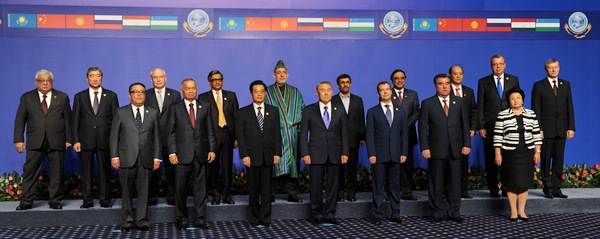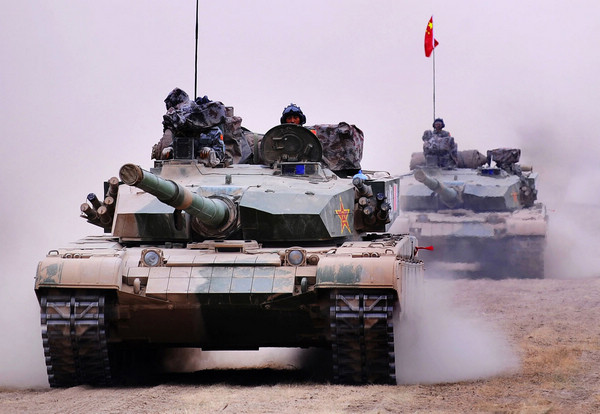Foreign and Military Affairs
Cooperation to combat terrorism
By Wu Jiao and Ma Liyao (China Daily)
Updated: 2011-06-16 07:25
 |
Large Medium Small |
|
 President Hu Jintao (third left, first row) and international leaders, participants and guests of the Shanghai Cooperation Organization summit in Astana, Kazakhstan, pose for a photo on Wednesday. [Photo / Agencies] |
ASTANA, Kazakhstan - President Hu Jintao called on Wednesday for stronger cooperation among the Shanghai Cooperation Organization (SCO) members to combat security threats in the region.
The statement came with a joint declaration of the SCO members earlier in the day, vowing to establish an inseparable international security community to guard information security, fight "the three evil forces" of terrorism, separatism and extremism, and combat drug trafficking.
Among mounting concerns over the security situation in Asia, the SCO is taking a more important role, observers said.
Security issues have become a hot topic since al-Qaida leader Osama bin Laden was shot to death in Pakistan in early May, which is considered a turning point of international anti-terrorism efforts, including in Afghanistan.
"It is possible that the SCO will assume responsibility for many issues in Afghanistan after the withdrawal of coalition forces in 2014," Kazakhstan President Nursultan Nazarbayev said in an op-ed piece for The Moscow Times on June 15.
"We believe that the prosperity of Central Asia and the surrounding states can only be achieved through a strong, independent and stable Afghanistan," he added.
As the biggest and most influential organization in the region, the SCO may very well take center stage in Asian security, but for that to happen, China and Russia must first act as trailblazers in the creation of such a system, said Sheng Shiliang, a chief researcher with the Center for Global Challenges Studies.
The "vacuum of power" that will be created by the withdrawal of US troops from Afghanistan may be one of the major threats to regional security because it will enhance the likelihood of terrorist acts in the region, Sheng said.
|
 Tanks of the People's Liberation Army participate in a joint anti-terror military exercise of member states of the Shanghai Cooperation Organization in September last year in Kazakhstan. [Jin Xianbin / for China Daily] |
More than 130,000 international soldiers are currently fighting an insurgency in Afghanistan. The troops, mainly soldiers from the United States and other NATO countries, are due to start limited withdrawals next month, with a full withdrawal scheduled for 2014.
The period until the withdrawal is fully finished is key to regional security, and the consequence of the withdrawal needs to be borne by surrounding regional countries, said Da Wei, an analyst from China Institutes of Contemporary International Relations.
"The Taliban may reach a reconciliation with the Afghan government after the withdrawal, which is expected by all, and personally I think the possibility is around 40 percent," Da said.
In order to achieve this favorable consequence, the SCO can do a lot - major nations in Central Asia can influence different interior powers of Afghanistan to promote peace talks, and stronger economic ties are also helpful to create a more stable environment, he added.
The SCO has been playing a vital role in maintaining regional stability and in the battle against terrorism during the past decade. It has organized frequent multilateral and bilateral anti-terrorism exercises to deter and contain unstable factors to regional stability.
At the summit on Wednesday, member states of the SCO also approved the 2011-2016 drug control strategy and its implementation plan, which would be conducive to enhancing the capabilities of member states in jointly dealing with drug threats in the region, said a communiqu released at the summit.
"But the members still need to consider how to enhance the organization's capability of dealing with urgent international political affairs," said Chen Yurong, a researcher at the China Institute of International Studies, pointing to the 2010 armed clash in Kyrgyzstan, which challenged regional stability.
Wei Ran and Yang Yating contributed to this story.

| 分享按鈕 |



